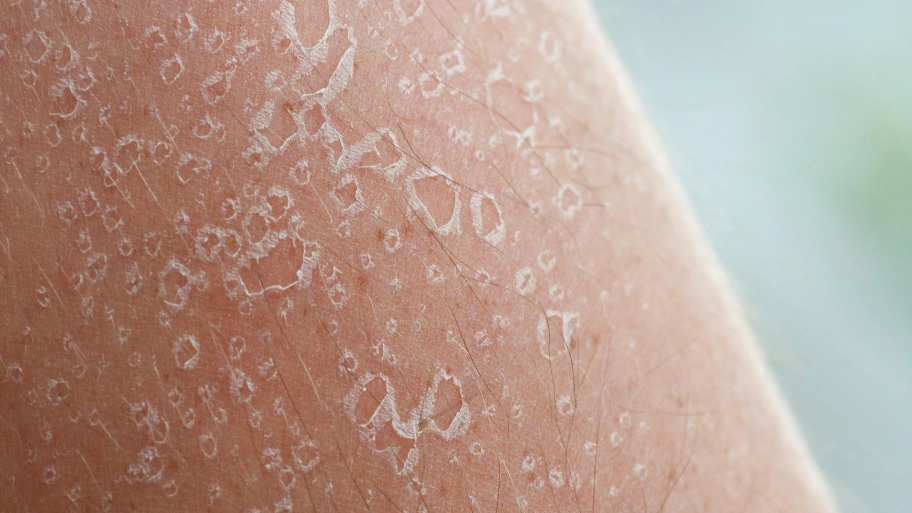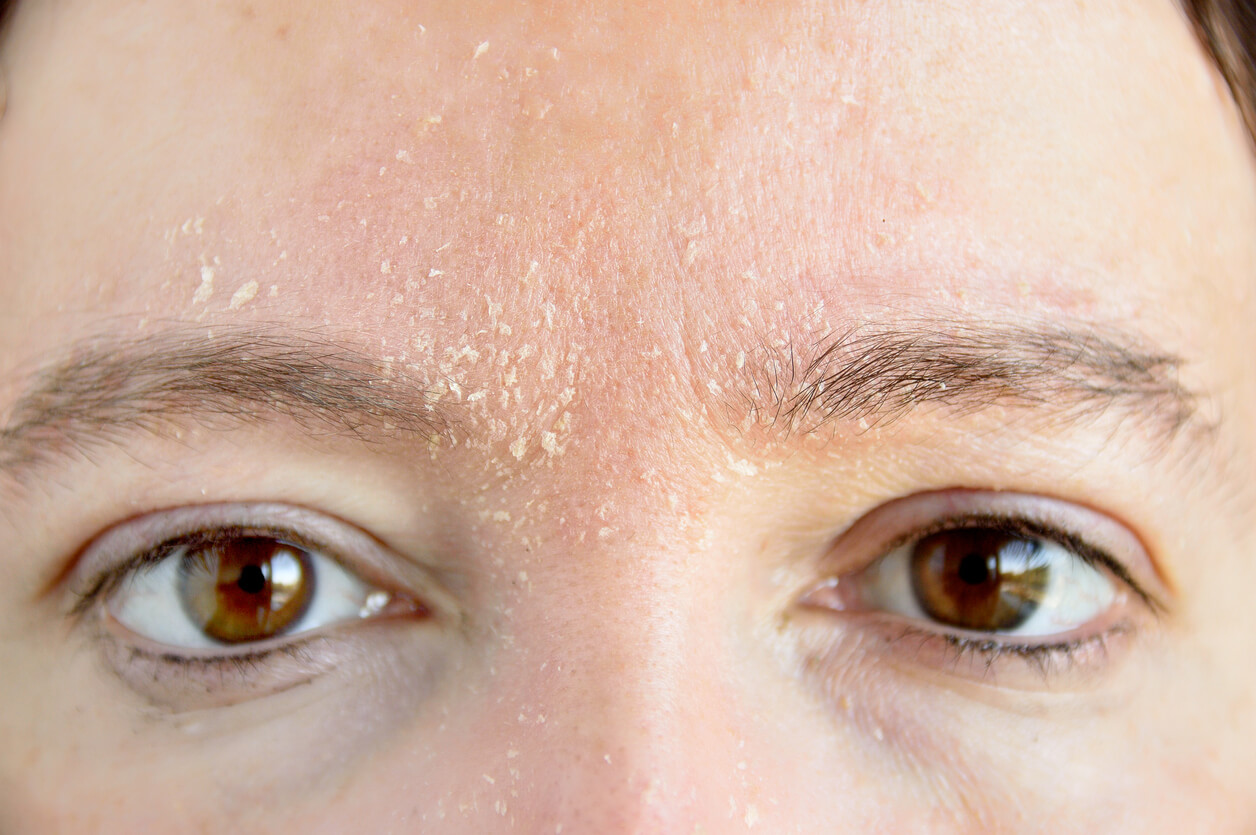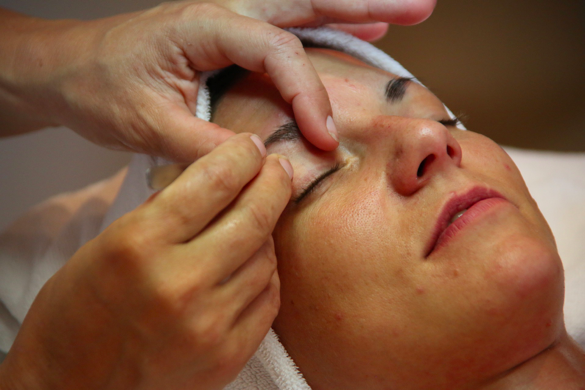Dry skin can be localized to one area of a person’s body or it can occur in many larger areas, or even all over. It can occur with or without lesions like blisters, rashes, and redness, but it always causes unpleasant itchy sensations.
Treating dry skin effectively often requires an understanding of the underlying condition that is causing it. This article will introduce eight possible causes of dry skin and offer some insight into how they can be treated.
Table of Contents
Damaged Moisture Barrier
Healthy skin has a built-in barrier of natural lipids that both retains moisture and keeps out irritants. When that barrier is breached by tiny cracks, it allows the skin’s natural moisture to escape while simultaneously making it easier for external irritants to reach the skin.
Those with compromised moisture barriers should avoid skincare products containing Sodium Laureth Sulfate and Ammonium Laureth Sulfate and should only use alcohol-free toners. Certain topical forms of vitamin C and antioxidants can also help, as can broad-spectrum sunscreen and lipid-rich moisturizers. Check out this website for more advice about combating moisture barrier damage.
Age-Related Dry Skin
As people age, their pores produce less oil. This can leave their skin feeling dry and itchy. More than half of all adults over the age of 40 struggle with dry skin at any given time, so older adults should know that they are not alone.
Older adults should take proactive steps toward protecting their skin. Wear sunscreen to avoid sun damage, avoid smoking, maintain a healthy diet, and use products designed for the right skin type. Those who are experiencing severe dry skin for the first time should see their doctors, no matter their age, as it can be a symptom of potentially serious diseases like kidney disease, liver disease, and diabetes.
Harsh Soaps and Detergents
A lot of today’s most popular soaps and shampoos strip moisture from the skin. This makes sense since they’re designed to remove oil. Unfortunately, the skin needs some oil to remain moist.
The best way to treat dry skin caused by harsh soaps is to switch to gentler skincare products. Cream-based cleansers tend to be less harsh. Some consumers also prefer to use gel-to-milk cleansers on dry, irritated skin.
Bathing and Swimming Habits
Taking long, hot showers and baths can cause dry skin. Swimming in highly-chlorinated pools can cause dry skin, as well. If consumers’ skin feels tight after bathing or swimming, it may indicate that the water evaporating off their skin following immersion is greater than the water added to their skin while they are bathing.
The easiest way to combat these factors is to avoid swimming in highly-chlorinated pools and excessively hot showers. Those who love hot showers can also turn the water down a few minutes before they get out to reduce evaporation after immersion. Using the right types of moisturizers immediately following bathing or swimming can also help.
Cold, Dry Weather
People with dry skin almost always notice that their condition worsens in the winter. The cold, dry weather can make eczema and age-related dry skin worse and can even induce dry skin in those with otherwise healthy moisture levels.
Installing a humidifier in the home can help to avoid problems with winter itch. It’s also important to drink plenty of water, as dehydration can make dry skin worse. Aim to drink at least eight glasses per day and feel free to incorporate tea, coffee, hot chocolate, and other hot beverages.
Vitamin Deficiency
Malnutrition can sometimes cause or exacerbate dry skin. Specifically, those who don’t get enough vitamin A often find that the condition of their skin worsens. Foods that contain high amounts of vitamin A include liver, fish like salmon, trout, and bluefish tuna, cheeses like cheddar, Limburger, Roquefort, blue cheese, cream cheese, feta cheese, and goat cheese, hard-boiled eggs, and caviar.
Vegans often have a harder time getting enough vitamin A through dietary sources alone. They can take vitamin A supplements, available over the counter at most pharmacies. Most multi-vitamins also contain vitamin A.
Complex Health Conditions
Several complex health conditions can cause dry skin. Most people know that dermatological conditions like eczema and psoriasis cause dry skin, but few realize that diabetes, hypothyroidism, and hormonal changes associated with menopause may also be to blame.
When dry skin is caused by complex health conditions, it’s important to head to a doctor for a detailed diagnosis. While this particular symptom can often be treated using over-the-counter moisturizers and other skincare products, the underlying condition will still need to be treated. Menopause and hypothyroidism can both be treated using hormone therapy and diabetes can be managed using a combination of lifestyle changes and medication interventions.
Medications that Cause Dry Skin
Not only do diverse health and hormone problems cause dry skin, but certain medications used to treat other disorders can have a similar impact. Medications like diuretics prescribed for high blood pressure, pharmaceutical drugs designed to lower cholesterol, and common acne treatments like Retin A and isotretinoin can all cause dry skin.
Treating dry skin induced by medication use can be difficult. Patients need their medications to maintain a high quality of living, but nobody wants to be itchy all the time. It’s best for those who are struggling with dry skin as a direct side effect of medication used to consult their doctors regarding what skincare products will best alleviate them.
The Bottom Line
Dry skin can be caused by anything from underlying diseases and disorders to changes in humidity and bathing habits. Lifestyle changes like altering the diet to incorporate more vitamin A and avoiding chlorinated pools can only help so much, though, and understanding the underlying causes of this unpleasant issue is only the first step.
It’s important for those dealing with dry skin to purchase specialized products that not only protect the skin’s natural moisture barrier but also reduce symptoms like itchiness, redness, and peeling. Combine preventative measures like avoiding harsh soaps and chemical cleaners with proactive use of specialized skincare products for best effects.Seeking expert advice and consulting trusted clinics like professionals at Epi Dermatology can provide tailored solutions for managing and improving dry skin.




